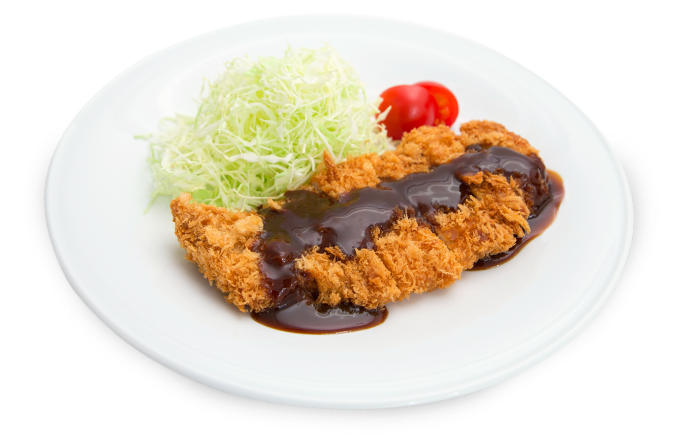
How do you make tonkatsu? What must accompany it?
We will analyze this food that represents Japan, tonkatsu, from various angles and teach you the secrets of its deliciousness.
Let's look at the basic components that make up tonkatsu plate.
In tonkatsu, there are many indispensable parts, not only the meat but also the sauce and garnish.
-

Pork
Tonkatsu uses thickly sliced pork chops or fillets. The advantage of fillets is that they are tender and have almost no fat. Pork chops on the other hand, has fat distributed through the entirety of the meat, making it more savory compared with fillets. Now that we know the characteristics of each, we can choose our cut of meat.
-

Panko
On the outside we use coarse grain "panko" bread crumbs. At specialty tonkatsu restaurants, the kind of panko used is called "raw panko", which has more moisture content to give a light and crispy exterior. On the other hand, dry panko allows heat to pass through easily, making it possible to create a crunchy texture; thus it is often used for home-made tonkatsu.
-

Oil
Several kinds of oils are used to make the frying oil, such as vegetable oil, lard, sesame oil, and olive oil. The amount of oil must be sufficient to completely submerge the meat. This is one of the secrets of frying, as it is this amount of oil which makes the tonkatsu so crispy, yet juicy inside.
-

Chopped cabbage
When asked what goes with tonkatsu, the answer would have to be cabbage. Together with the meat, the crispy, crunchy, moderate sweetness makes tonkatsu even more delicious. Not only does this provide a nutritious balance of animal proteins from the pork and vegetable proteins from the cabbage, it also has the effect of clearing the aftertaste of fried food.
-

Sauce
The deliciousness of tonkatsu is determined by the presence of sauce. In Japan, it is common to eat tonkatsu topped with tonkatsu sauce, a sweet and rich sauce made for tonkatsu. This sauce is not only the perfect match for tonkatsu, but also goes well with the cabbage and white rice.


Let's try making tonkatsu! ~tonkatsu recipe~
Inside the crispy, fragrant fried exterior is packed with deliciousness.
Let's learn the secret of the proper oil temperature for frying to master the making of juicy tonkatsu.
1 serving 501kcal
Cooking time 25 min
Ingredients (serves two)

2 pork chops (about 100g per chop)
Salt to taste
Pepper to taste
Batter
Flour (an appropriate amount)
Egg (an appropriate amount)
Panko (an appropriate amount)
Garnish
Cabbage(an appropriate amount)
Cherry tomatoes (4)
Tonkatsu Sauce (an appropriate amount)
Frying oil (an appropriate amount)
Instructions
 |
1 |
Season the pork Make several slits on the connective tissue between the lean and fatty parts with the tip of a kitchen knife to keep the meat from warping during frying, then season both sides of the meat with salt and pepper. |
 |
2 |
Breading the pork Cover both sides with flour. Shake off excess flour and dip in the beaten egg. |
 |
3 |
Put it in the hot oil Heat the frying oil to 170°C(*) and gently place the coated pork in. |
 |
4 |
Fry until crispy Leave it that way for a while; when it feels crispy when touched with a chopstick, turn it over. Fry until golden brown. |
 |
5 |
Serve Serve on a plate. Garnish with finely chopped cabbage and cherry tomatoes, then drizzle with sauce. |

